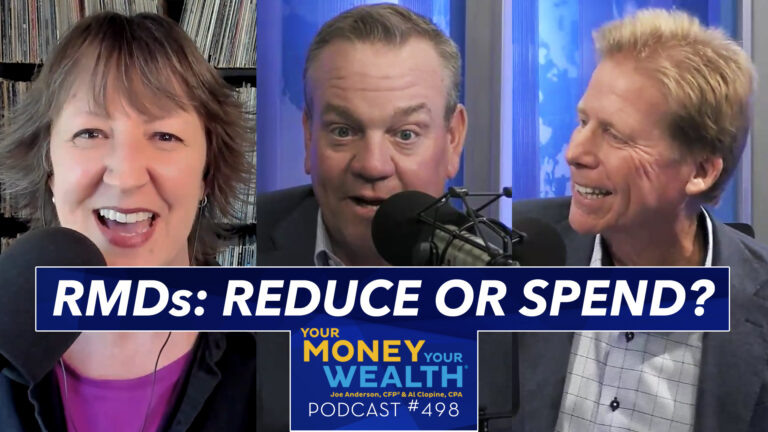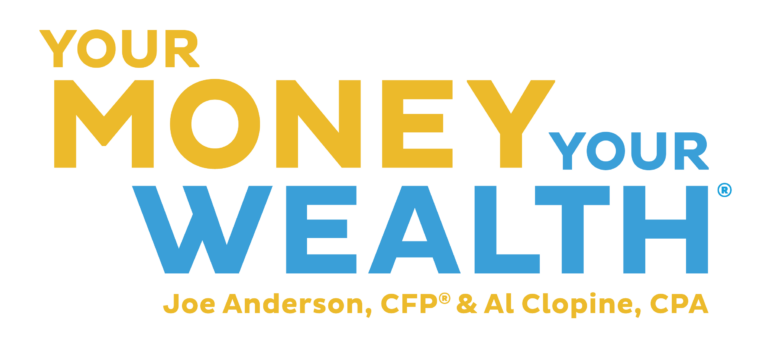Your 401(k) plan options probably include at least one target-date fund. Joe Anderson, CFP® and Alan Clopine, CPA discuss this one-step strategy for investing for retirement in episode 72 of the YMYW podcast, then answer listeners’ investing questions. Original publish date October 8, 2016 (hour 2). Note that content may be outdated as rules and regulations have changed.
00:00 – Intro
02:47 – “Unfortunately, a lot of you are not using these target-date funds correctly…first of all, a target-date fund has its own allocation.”
07:53 – “There are two expenses in any investment: expense ratios and then the other cost is risk.”
11:32 – “Should I withhold my taxes when purchasing a home?”
17:06 – “Will I be taxed if I don’t touch the funds in a transferred IRA?”
19:21 – “We now have a monthly standing lunch n’ learn; it’s called Road to Retirement…it’s an introduction to financial planning and the key areas you should look at. We’ll go into some specific strategies when it comes to taxes, Social Security, investments.”
22:02 – “What are the pros and cons of investing before/after tax dollars into a 401(k)?”
26:34 – “If we were disciplined enough to save those tax savings and invest it, we’d probably come out ahead…but most of us don’t do that and we just spend whatever we have.”
28:59 – “What should I do with my portion of my ex-husband’s IRA?”
32:47 – “I am 51 years old and finally in a job which offers a 401(k) option…should I invest in my 401(k) or pay off my debt?”
35:58 – “Even if I don’t have an [employer] match, I still want to save for retirement and I don’t want to ignore it. The longer you give that money to compound, the more you’re going to have. So the sooner you start saving, the better.”
Listen to the YMYW podcast:

Amazon Music
AntennaPod
Anytime Player
Apple Podcasts
Audible
Castbox
Castro
Curiocaster
Fountain
Goodpods
iHeartRadio
iVoox
Luminary
Overcast
Player FM
Pocket Casts
Podbean
Podcast Addict
Podcast Index
Podcast Guru
Podcast Republic
Podchaser
Podfriend
PodHero

Podknife
podStation
Podverse
Podvine
Radio Public
Rephonic
Sonnet
Spotify
Subscribe on Android
Subscribe by Email
RSS feed
IMPORTANT DISCLOSURES:
Pure Financial Advisors is a registered investment advisor. This show does not intend to provide personalized investment advice through this broadcast and does not represent that the securities or services discussed are suitable for any investor. Investors are advised not to rely on any information contained in the broadcast in the process of making a full and informed investment decision.
• Investment Advisory and Financial Planning Services are offered through Pure Financial Advisors, LLC, a Registered Investment Advisor.
• Pure Financial Advisors LLC does not offer tax or legal advice. Consult with your tax advisor or attorney regarding specific situations.
• Opinions expressed are not intended as investment advice or to predict future performance.
• Past performance does not guarantee future results.
• Investing involves risk including the potential loss of principal. No investment strategy can guarantee a profit or protect against loss in periods of declining values.
• All information is believed to be from reliable sources; however, we make no representation as to its completeness or accuracy. As rules and regulations change, content may become outdated.
• Intended for educational purposes only and are not intended as individualized advice or a guarantee that you will achieve a desired result. Before implementing any strategies discussed you should consult your tax and financial advisors.
CFP® – The CERTIFIED FINANCIAL PLANNER™ certification is by the Certified Financial Planner Board of Standards, Inc. To attain the right to use the CFP® designation, an individual must satisfactorily fulfill education, experience and ethics requirements as well as pass a comprehensive exam. Thirty hours of continuing education is required every two years to maintain the designation.
AIF® – Accredited Investment Fiduciary designation is administered by the Center for Fiduciary Studies fi360. To receive the AIF Designation, an individual must meet prerequisite criteria, complete a training program, and pass a comprehensive examination. Six hours of continuing education is required annually to maintain the designation.
CPA – Certified Public Accountant is a license set by the American Institute of Certified Public Accountants and administered by the National Association of State Boards of Accountancy. Eligibility to sit for the Uniform CPA Exam is determined by individual State Boards of Accountancy. Typically, the requirement is a U.S. bachelor’s degree which includes a minimum number of qualifying credit hours in accounting and business administration with an additional one-year study. All CPA candidates must pass the Uniform CPA Examination to qualify for a CPA certificate and license (i.e., permit to practice) to practice public accounting. CPAs are required to take continuing education courses to renew their license, and most states require CPAs to complete an ethics course during every renewal period.










